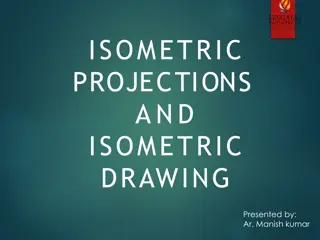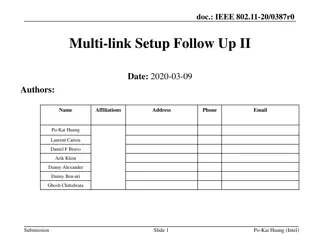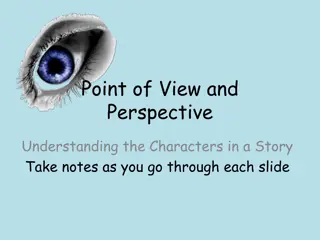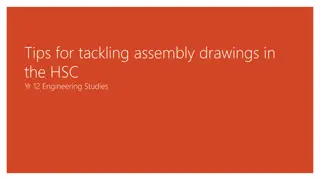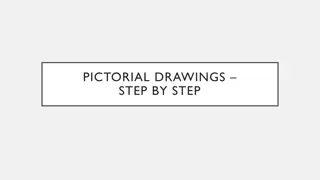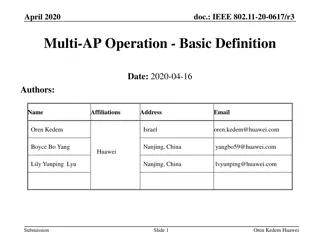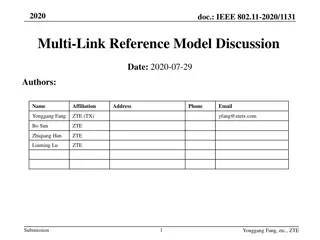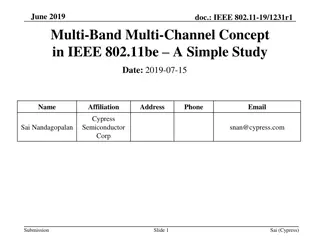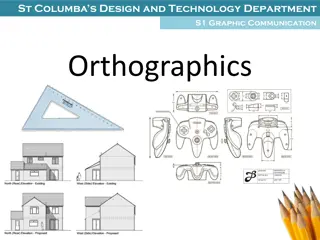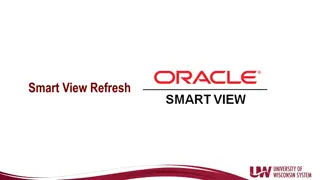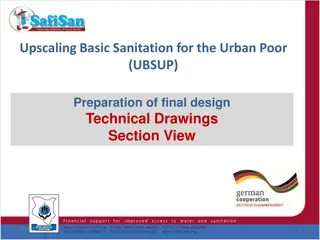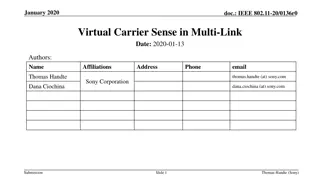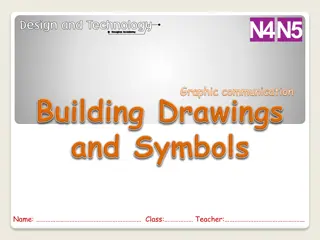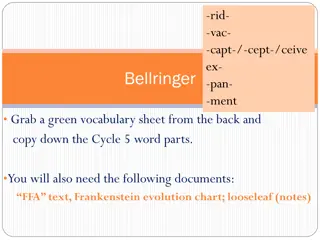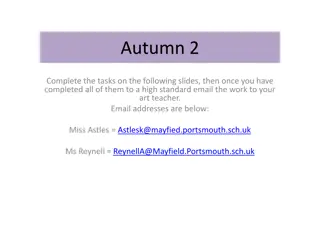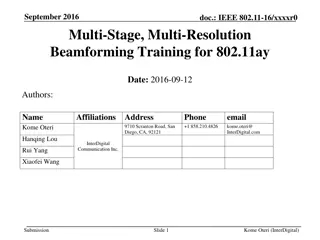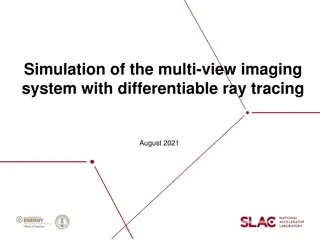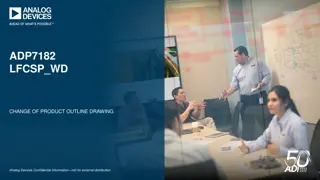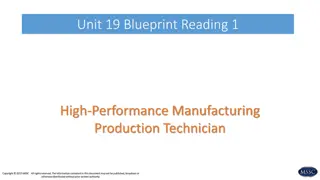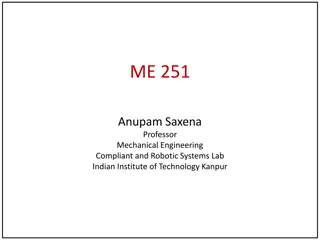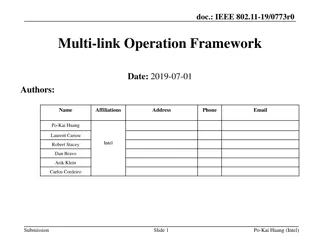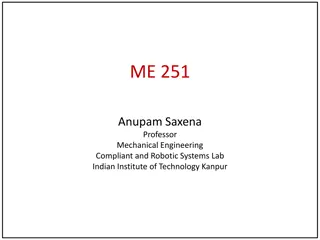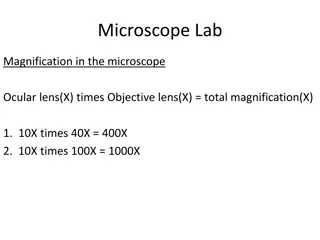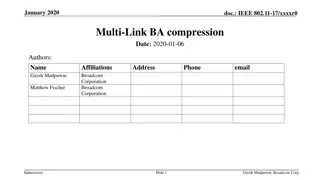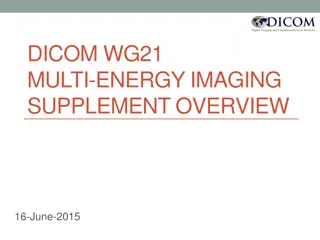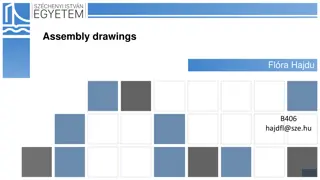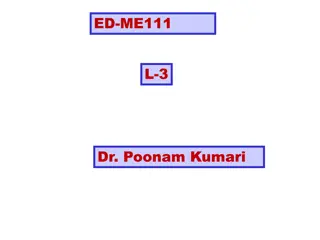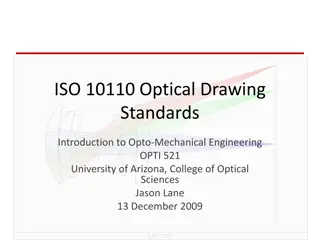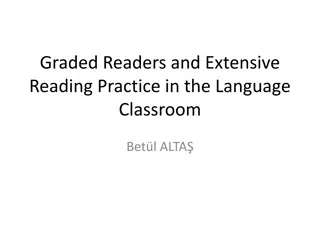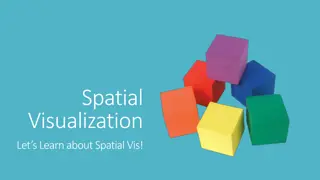Understanding Isometric Projections and Drawings
Isometric projections provide a way to represent objects in three dimensions on a two-dimensional surface, making it easier for non-technical individuals to grasp complex shapes. This article discusses the differences between orthographic and pictorial views, principles of projection, types of proje
6 views • 10 slides
Progress on IEEE 802.11 Multi-link Setup
Significant developments have been made in the multi-link setup within the IEEE 802.11 framework. The focus is on allowing only one STA in the MLD framework, differentiation with STA-level associations, and the rationale behind restricting to one STA. Proposals for defining multi-link devices and re
0 views • 12 slides
Understanding Point of View and Perspective in Storytelling
Exploring the concepts of point of view and perspective in storytelling is crucial for understanding characters in a narrative. Point of view defines how the author presents the story to readers, while perspective delves into the lens through which the story is told, offering insights into character
1 views • 10 slides
Tips for Tackling Assembly Drawings in HSC Yr 12 Engineering Studies
When approaching assembly drawings in HSC Yr 12 Engineering Studies, start by analyzing the question and identifying key criteria. Follow AS1100 standards, focus on dimensions and notes, align components carefully, and add detail progressively. Use simple drawing tools and apply sectioning where nee
1 views • 10 slides
Step-by-Step Guide for Creating Pictorial Drawings
Learn how to create pictorial drawings step by step with detailed instructions and visuals. Follow along to sketch objects viewed from different directions such as antennas and toggle switches. Understand the importance of orientation, proportion, and scale in producing accurate and detailed drawing
0 views • 8 slides
Understanding Multi-AP Operation in IEEE 802.11-20-0617/r3
Explore the basic definitions and key features of Multi-AP operation in the IEEE 802.11 standard. Learn about Multi-AP Candidate Set (M-AP-CS) and Multi-AP Operation Set (M-AP-OS) along with their participants and formation. Delve into the concepts of Coordinator AP, Coordinated AP(s), and reliable
0 views • 19 slides
IEEE 802.11-2020 Multi-Link Reference Model Discussion
This contribution discusses the reference model to support multi-link operation in IEEE 802.11be and proposes architecture reference models to support multi-link devices. It covers aspects such as baseline architecture reference models, logical entities in different layers, Multi-Link Device (MLD) f
1 views • 19 slides
IEEE 802.11-23/1980r1 Coordinated AP-assisted Medium Synchronization Recovery
This document from December 2023 discusses medium synchronization recovery leveraging multi-AP coordination for multi-link devices. It covers features such as Multi-link device (MLD), Multi-link operation (MLO), and Ultra High Reliability (UHR) capability defined in P802.11bn for improvements in rat
0 views • 8 slides
Understanding Multi-Band Multi-Channel Concept in IEEE 802.11be
Exploring the benefits of Multi-Band Multi-Channel (MBMC) operation in IEEE 802.11be, this study delves into the efficient use of spectrum, increased data rates, and network load balancing. It also discusses the envisioned usage models and compares Single Band Operation with Multi-Band Operation, hi
1 views • 20 slides
Exploring Orthographic Drawing in Design and Technology Education
Delve into the world of orthographic drawing through St. Columba's Design and Technology Department's S1 Graphic Communication program. Discover the significance of orthographics in visualizing 3D objects as 2D drawings, learn about orthographic views like Elevation, Plan, and End Elevation, and exp
0 views • 8 slides
Using Smart View in PlanUW: Data Input and Reporting
Learn how to efficiently input data and build reports in PlanUW using Smart View. Discover the differences between data input forms and Ad Hoc grids, understand when to use each, and explore the steps involved in entering data via Ad Hoc. Find out how to open forms and reports in Smart View, as well
0 views • 6 slides
Understanding Plane Surfaces in Engineering Drawings
Exploring the concept of plane surfaces in technical drawings, this informative content covers the definition, characteristics, and positioning of planes in space relative to projection planes. It also delves into the projections of various plane surfaces parallel, perpendicular, and inclined to pri
0 views • 9 slides
Examples of Advanced View Wireframes for Order Management System
This content showcases wireframe examples of an Advanced View for managing orders in a system. Each order has its own view with data connected in different tabs. The Details Slidein provides a summary of offers, orders, and customers, while the detailed view offers more in-depth information. The ima
0 views • 19 slides
Urban Poor Sanitation Upgrading: Technical Design Drawings
Preparation of final design technical drawings for upscaling basic sanitation in urban poor areas. The session covers baseline data collection, existing levels, and required minimum levels for effective sanitation infrastructure. Details on drainage channels and design cross-section drawings are inc
0 views • 16 slides
Virtual Carrier Sense in Multi-Link Networks
This document discusses the implementation and advantages of virtual carrier sense in multi-link networks under the IEEE 802.11 standard. It explores the operation of multi-link setups, asynchronous communication benefits, and the necessity of multiple contention channels. The concept of NAV (Networ
2 views • 11 slides
Understanding Building Drawings in Graphic Communication
Building drawings play a crucial role in the construction industry, providing detailed plans for architects, builders, plumbers, electricians, and joiners. These drawings include location plans, floor plans, sectional views, elevations, and schematic diagrams, each serving a specific purpose in the
0 views • 11 slides
Performance Aspects of Multi-link Operations in IEEE 802.11-19/1291r0
This document explores the performance aspects, benefits, and assumptions of multi-link operations in IEEE 802.11-19/1291r0. It discusses the motivation for multi-link operation in new wireless devices, potential throughput gains, classification of multi-link capabilities, and operation modes. The s
0 views • 30 slides
Analyzing Character Development and Point of View in Literature
The content provides guidance on analyzing the development of characters in literary texts, evaluating authors' choices of point of view, and understanding how these elements influence readers' perceptions. It includes discussions on Victor's view of science in "Frankenstein," guiding questions for
0 views • 8 slides
Nature Drawing Tasks for Art Class
Complete a series of nature drawing tasks including recreating shells, creating skull drawings, experimenting with mark making techniques, and working on charcoal drawings. Reflect on your work to improve and develop your drawing skills further.
0 views • 6 slides
Urban Poor Sanitation Design Technical Drawings and Planning View
Ensuring basic sanitation for urban poor, this project involves designing and planning technical drawings with a focus on upscaling basic sanitation facilities. The content provides insight into the context of the session, potential DTF layouts, considerations during layout preparation, and baseline
0 views • 17 slides
Explainable Recommendation Using Attentive Multi-View Learning
The research presented at the 33rd AAAI Conference on Artificial Intelligence focuses on developing an explainable deep model for recommendation systems. It addresses challenges in extracting explicit features from noisy data and proposes a Deep Explicit Attentive Multi-View Learning Model. This mod
0 views • 19 slides
Multi-Stage, Multi-Resolution Beamforming Training for IEEE 802.11ay
In September 2016, a proposal was introduced to enhance the beamforming training procedures in IEEE 802.11ay for increased efficiency and MIMO support. The proposal suggests a multi-stage, multi-resolution beamforming training framework to improve efficiency in scenarios with high-resolution beams a
0 views • 11 slides
Insights into Multi-View Imaging System Optimization
Delve into the simulation and calibration of a multi-view imaging system using differentiable ray tracing and gradient-based optimization. Explore the challenges of ambiguity in results and the impact of angular offset on imaging accuracy. Discover how the system handles errors and maintains precise
0 views • 6 slides
Analog Devices Product Outline Drawings Comparison
This content compares three different product outline drawings from Analog Devices, focusing on the differences in exposed paddle length and width, as well as the Pin1 indicator. It provides detailed information on the CP-8-5 and CP-8-13 packages, highlighting key specifications and dimensions. The
0 views • 4 slides
Approach of Line Vectorization in Engineering Drawings Based on Semantic Segmentation
Engineering drawings often need to be redrawn or reedited over time, leading to a high workload. To address this issue, a line segment vectorization method based on semantic segmentation is proposed. By using advanced algorithms and techniques, this approach aims to extract and vectorize line elemen
0 views • 14 slides
Blueprint Reading for High-Performance Manufacturing Technicians
Explore the world of blueprint reading in high-performance manufacturing through a hands-on course that covers multi-view drawings, individual work tasks, and online resources. Dive into sketching multi-view drawings and completing assigned labs. This course is fully funded by MoSTEMWINs and offers
0 views • 7 slides
Advanced Techniques in Shape and Illumination Analysis
Exploring cutting-edge methods such as shape recovery from varying illumination and viewpoint, dynamic shape refinement from multi-view video, and depth estimation through photometric stereo constraints. The process involves factorization, compute depth maps, normal field calculations, and final sur
0 views • 13 slides
Anupam Saxena's ME 251 Lecture III - Part and Assembly Drawings: Example II
Anupam Saxena, a professor in Mechanical Engineering at the Indian Institute of Technology Kanpur, presents a detailed study on part and assembly drawings in ME 251 Lecture III. The lecture covers examples such as non-return valves, threaded fasteners, bolts, nuts, sizes, proportions, and representa
0 views • 18 slides
IEEE 802.11-19/0773r0 Multi-link Operation Framework Summary
The document discusses the multi-link operation framework for IEEE 802.11-19/0773r0, focusing on load balancing and aggregation use cases. It introduces terminology related to multi-link logical entities and provides examples of multi-link AP and non-AP logical entities. The framework considers stee
0 views • 16 slides
Exploring Feed Check Valve Assembly in Mechanical Engineering Lab
Dive into the detailed assembly drawings of a feed check valve prepared by Professor Anupam Saxena and his team in the Mechanical Engineering Compliant and Robotic Systems Lab at the Indian Institute of Technology Kanpur. The drawings highlight various components like the body, cover, valve seat, sp
0 views • 17 slides
Understanding Multi-morbidity and Deprivation in UK General Practice
Exploring the association between multi-morbidity, deprivation, and life expectancy in the context of UK general practice. The research aims to quantify socio-economic inequalities in chronic disease onset and life expectancy, particularly among older populations with multi-morbidity. Methods includ
0 views • 27 slides
Microscope Lab - Understanding Magnification, Field of View, and Object Size
Exploring the principles of microscopy, this guide covers magnification calculations, relationships between magnification and field of view at different powers, sizing objects within the field of view, and determining total magnification in drawings. Visual aids enhance the understanding of these co
0 views • 7 slides
IEEE 802.11-17: Enhancing Multi-Link Operation for Higher Throughput
The document discusses IEEE 802.11-17/xxxxr0 focusing on multi-link operation for achieving higher throughput. It covers motions adopted in the SFD related to asynchronous multi-link channel access, mechanisms for multi-link operation, and shared sequence number space. Additionally, it explores the
0 views • 14 slides
Overview of DICOM WG21 Multi-Energy Imaging Supplement
The DICOM WG21 Multi-Energy Imaging Supplement aims to address the challenges and opportunities in multi-energy imaging technologies, providing a comprehensive overview of imaging techniques, use cases, objectives, and potential clinical applications. The supplement discusses the definition of multi
0 views • 33 slides
Understanding Engineering Assembly Drawings and Detail Requirements
Engineering assembly drawings play a crucial role in providing detailed information for the manufacture and assembly of machines and structures. Quality assurance requirements, working drawings, and detail drawing specifications are essential aspects covered in this content. Properly created assembl
0 views • 20 slides
Understanding Scales and Representative Fractions in Technical Drawings
Scales play a crucial role in technical drawings by representing the ratio of the linear dimensions of an object to its actual dimensions. This text explains the concept of scales, including enlargement and reduction scales, representative fractions (RF), recommended scales by BIS (SP.46: 2003), and
0 views • 29 slides
Understanding ISO 10110 Optical Drawing Standards
ISO 10110 Optical Drawing Standards provide guidelines for preparing drawings of optical elements and systems, essential for interpreting optical drawings accurately. The standard includes 13 parts covering aspects such as material imperfections, surface form tolerances, and more. Compliance with IS
0 views • 17 slides
Understanding Theories of Reading Processes in Language Learning
Explore different theories of reading processes in language learning, including the traditional view, bottom-up view, cognitive view, and metacognitive view. Discover how readers acquire skills, the importance of linguistic features, and the role of readers in understanding texts. Dive into intensiv
0 views • 21 slides
Spatial Visualization Techniques and Isometric Drawings
Explore spatial visualization concepts through activities like rotating shapes, connecting dots in isometric drawings, depicting 3D cubes, and creating coded plans for isometric views. Learn how to draw isometrically, define axes, and align paper for accurate representation. Develop skills in visual
0 views • 29 slides
Understanding Scale Drawings and Compass Points
Learn to interpret information from problems, create scale drawings, solve real-life problems using scale drawings, understand compass points, and follow directions accurately. Practice solving problems involving scale drawings, bearings, compass points, and map directions to enhance your spatial sk
0 views • 19 slides
